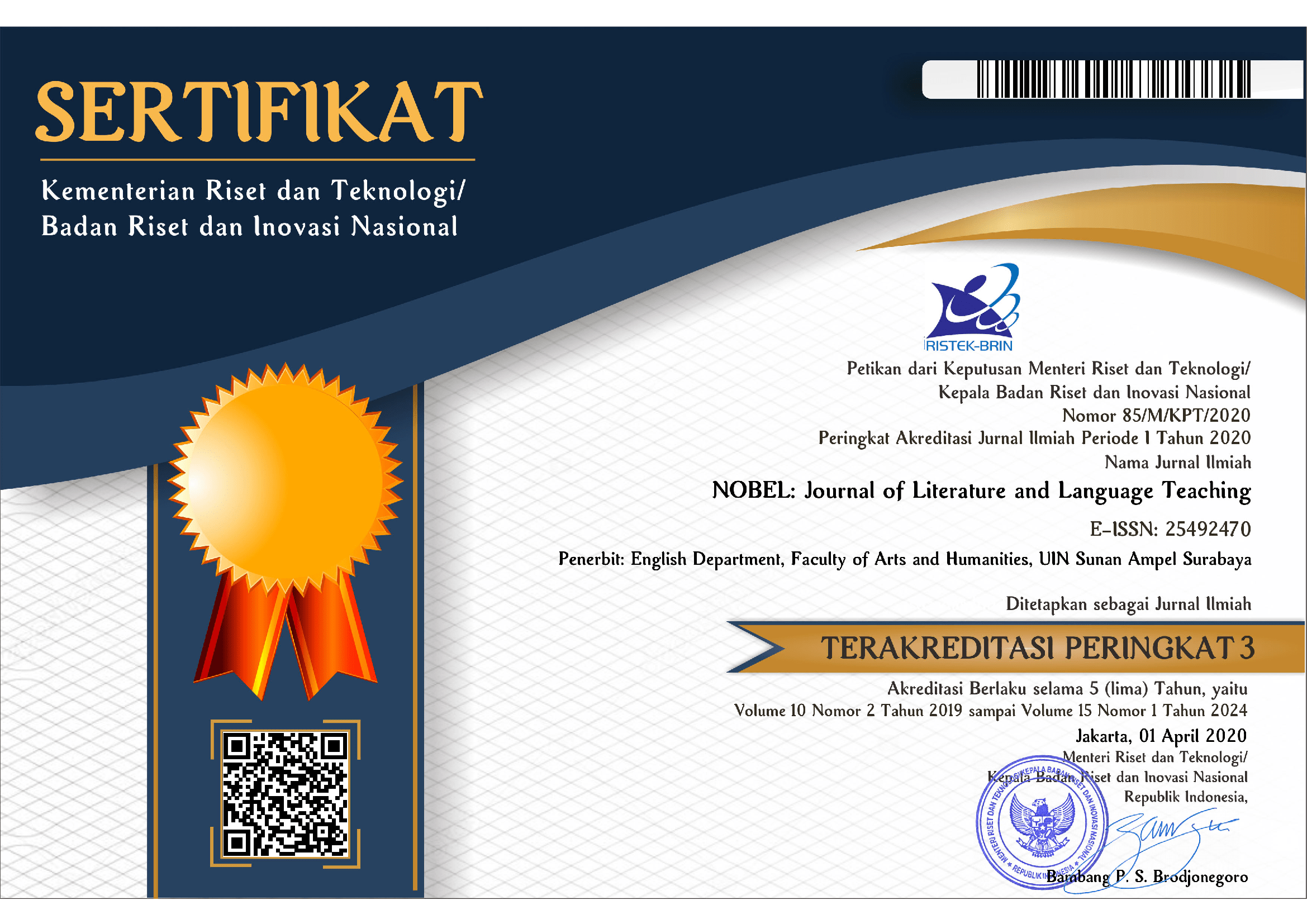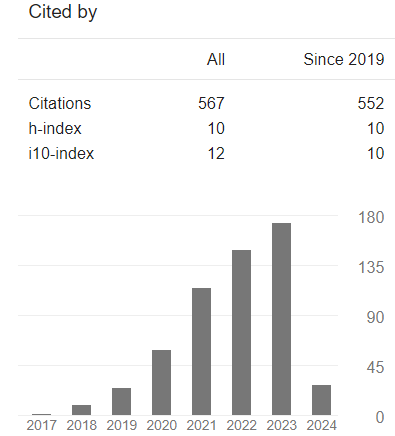Verbal Disagreeing Strategies in Detective Conan Movie Series
DOI:
https://doi.org/10.15642/NOBEL.2017.8.2.112-128Keywords:
disagreeing strategies; criminals; Detective Conan movie seriesAbstract
This study is meant to investigate the ways of male and female criminals express types of verbal disagreeing strategies in Detective Conan movie series. To collect the data, 30 criminals (15 males, 15 females) were selected among hundreds of criminals appeared in the movie. The criminals were expected to disagree with 6 chosen interlocutors when they do debate over the accusation pointed to the criminals. The types of disagreeing strategies which help the researcher to analyze the disagreeing strategies in criminals are based on Muntigl and Turnbull taxonomy (in Behnam & Niroomand, 2011:208). Qualitative content analysis is chosen to examine the criminals' disagreeing strategies. The results show that male criminals performed more disagreeing strategies by applying 56 disagreements, and female criminals applied 48 disagreements. From those disagreements, it is found new types of disagreeing strategies in addition to the types from the taxonomy of Muntigl and Turnbull (in Behnam & Niroomand, 2011:208)
Downloads
References
Aisyah, A. S. (2015). Interlanguage Pragmatics of Disagreement by Indonesian EFL Learners. Publication Article, Muhammadiyah University of Surakarta.
Anugramatur, D. SP. (2013). Speech Function in the Comic Entitled “Detective Conanâ€. (Thesis, Diannuswantoro University, Semarang).
Arofah, S. (2015). Verbal Disagreeent Strategies Used by Greg towards His Father and His Future Father-in-Law in “Meet The Fockers†Movie. (Thesis, UIN SunanAmpel Surabaya).
Bavarsad, S. S., Eslami-Rasekh, A. &Simin, S. (2015). The Study of Disagreement Strategies to Suggestion Used by Iranian Male and Female learners. Journal of Pragmatics,49, 30-42. Retrieved March 3, 2016 fromhttp://dx.doi:10.18052/www.scipress.com/ILSHS.49.30
Behnam, B. &Niroomand, M. (2011). An Investigation of Iranian EFL Learners’ Use of Politeness Strategies and Power Relations in Disagreement across Different Proficiency. English Language Teaching, 4, 204-220. Retrieved March 3, 2016 from http://dx.doi.org/10.5539/elt.v4n4p204
Bella, S. (2011). Mitigation and politeness in Greek invitation refusals: Effects of length of residence in the target community and intensity of interaction on non-native speakers’ performance. Journal of Pragmatics, 43, 1718-1740.
Carolina. (2011). The Study of Disagreement Between Characters in The Film Ten Things I Hate about You. (Thesis, Petra University, Surabaya)
Cavanagh S. (1997). Content analysis: concepts, methods and applications.Nurse Researcher, 4, 5–16.
Cole F.L. (1988). Content analysis: process and application. Clinical Nurse Specialist, 2(1), 53–57.
Choyimah, N. & Latief, M. A. (2014). Disagreeing Strategies in University Clasroom Discussions among Indonesian EFL Learners.International Journal of Linguistics, 6(2), 132-152.Retrieved March 3, 2016 from http://dx.doi.org/10.5296/ijl.v6i2.5417
Destiyani, S. (2011). FaktorKejiwaanSebagaiPendorongPelakuTindakPidanadanKaitannyadenganPenjatuhanVonisPidana. (Thesis, UIN SyarifHidayatullah, Jakarta).
Faharani, A. A. K. & Molkizadeh, A. P. (2013). An investigation of Iranian Advanced EFL learners’ Application of Politeness Strategies in Disagreement between Two Genders. Intenational Research Journal of Applied and Basic Sciences, 5(5), 628-633.
Heidari, A., Eslami-Rasekh, A. & Simin, S. 2015. Politeness Strategies and Power Relations in disagreement. International Journal of Research Studies in Languange Learning, 4(2), 33-41.
Hei, K. C., Meng. N. Y., Ling. W. N. & Palaniappan. A. (2012). Gender Differences in Coping with Disagreements: Focus on Young Malaysians. Paper presented at Social Science Conference 2012, Bursa, Turkey.
Kozcogh, H. V. (2012). The Effects of Gender and Social Distance on the Expression of Verba; Disagreement Employed by Hungarian Undergraduate Students.(Doctoral dissertation,University of Debrecen).
Koczogh, H. V. (2013). The role of gender in verbal disagreement: A study of disagreement strategies employed by Hungarian undergraduate students. Gender Studies, 11(1), 229-239.
Norouzi, M. (2015). Invesgating Politeness Strategies for Using Disagreements by Iranian EFL Learners at Different Proficiency Levels. 8(2), 89-102.
Panic-Kavgic, O. (2013). Patterns of Dispreffered Verbal Disagreement in Dialogues from American and Serbian Films. Jezikoslove, 445-459.
Pattrawut, C. (2014). A Cross-Cultural Pragmatic Study: Politeness Strategies and Realizations of the Strategies Used to Perform Student-Lecturer Multiple Disagreements by Native Speakers of Thai and English. Journal of Education and Social Research. 4(1), 147-158.
Rahman, R. (2015). An Analysis of Illocutionary and Perlocutionary Act in Detective Conan Comic. (Thesis, UIN SyarifHidayatullah, Jakarta).
Rees-Miller, J. (2000). Power, severity, and context in disagreement. Journal of Pragmatics, 32(8), 1087-1111.
Rohmah, Z. (2012). Promoting Harmony during Disagreements: A portrait of Adult Discussions in the Indonesian Context. Theory and Practice in Language Studies, 2(3), 440-449.
Sadrameli, S. M. H. &Haghverdi, H. R. (2016). A Comparative Study of the Use of Disagreement Strategies among Iranian EFL Learners and Native Speakers of English. Journal of Applied Linguistics and Language Research, 3(6), 230-251.
Sofwan, A. &Suwignyo, E. (2011). The Realization of Disagreement Strategies by Non- Native Speakers of English. Language Circle; Journal of Language and Literature, 6(1). 41-56.
Tifani, D. N. I. (2015). Disagreement Strategies Used by Dre Parker as the Main Character in Karate Kid Movie. (Thesis, UIN Sunan Ampel Surabaya).
Downloads
Published
How to Cite
Issue
Section
License
Copyright (c) 2017 NOBEL: Journal of Literature and Language Teaching

This work is licensed under a Creative Commons Attribution 4.0 International License.







